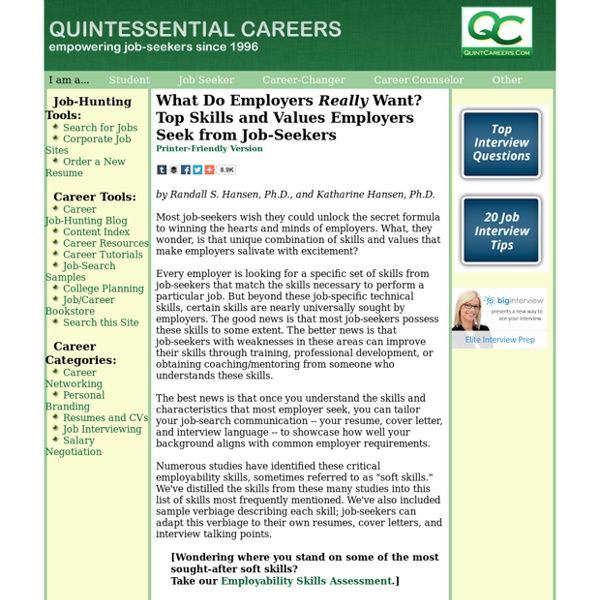10 Skills You Need to Succeed at Almost Anything
What does it take to succeed? A positive attitude? Well, sure, but that’s hardly enough. The Law of Attraction? The Secret? These ideas might act as spurs to action, but without the action itself, they don’t do much.
Skills Employers Seek
Back to Careers Page Index Back to Psych Web Home Page As you take your undergraduate courses, you may wonder how they are going to help you eventually "on the job." A good approach is to take a skills orientation. Think of your courses not only as ways of learning about particular subjects but also as learning experiences which refine a variety of specific skills.
Sample Retail Store Clerk Resume
Home » Retail Resume » Sample Retail Store Clerk Resume Retail store clerk resume must efficiently highlight your important details, so that it can quickly grab the attention of your prospective job recruiter. However, the retail jobs are fairly very common, and therefore, this field is extremely simple, and a perfect way to begin your career in this suitable industry. You have to take essential efforts while preparing your exceptional resume, as it can surely assist you in getting a perfect job of your wish. The resume should reflect your pertinent skills, and exceptional abilities that are associated to the applied job position.
4 Nifty Online Places Your Resume Can Live
Your resume is an awesome tool. In your job search, you use your resume for just about everything. Between blindly submitting it to various companies and passing it along to a friend of a friend, your resume goes through a lot. Your paper resume works hard already, but what about your online resume? You pass it out to potential employers, but how else do you use it? Simply having your resume online does wonders for your SEO (search engine optimization) by linking professional keywords to your overall brand.
Careers Centre - Advice and guidance - Applying for jobs - Skills
When applying for jobs It is important to provide evidence of your skills and this can come from work experience, academic work, your social life and any interests you pursue. Below is a selection of the skills that employers are looking for in graduates. Analytical ability The ability to assess a situation or issue and identify key elements that need to be addressed to move on. You will have used this skill in your academic work to solve problems, in your choice of university course and where you decided to live. Commercial awareness Being aware of the business issues affecting the sector to which you are applying.
Writing Your Resume; Use the “So What?” Method
Credit to PhotoRack.net Your resume has to tell potential employers what you can do for them. Yet people still fall into the trap of writing sentences that describe their job duties instead of their skills. A simple way to avoid this is to use the “so what” method of writing a resume.
How to set your expectations after an interview
What is the worst part of an interview? If you ask me, its the not knowing that drives me crazy. ME: Did I get the job? Do I have a chance? If I did, would you even tell me?
A List Of Personal Skills To Help You With Your Career Change
| Home | Getting Started | Know Yourself | Career Tests | Money Issues | Keeping Motivated | Resume Help | Successful Interviews | Blog | About Me | Contact | What are you good at and what skills do you enjoy using? I have created a list of personal skills below which you can read through and review in two key ways: assess and rate the skills you think you haveassess and rate the skills you really enjoy using These two steps are important, because when you are exploring new career ideas you should be looking at the things you are good at and that you really enjoy. Many of us develop skills over the years because we have to, but these may not be the ones that you take pleasure in exercising.
30 Artistic and Creative Résumés
In these tough economic times, many designers find themselves applying for jobs and freelance gigs on a regular basis. So, how can we stand out from the rest and grab the attention of a design agency when they’re usually bombarded with hundreds of applications? The best way to do this is in the design of your resume. Assuming that you have the skills that they’re looking for, a striking and visually appealing resume will go a long way at getting you the creative job that you want. In the worst case scenario, it will at least buy you a few seconds by catching the eye of a recruiter and may become the difference between getting hired or not. In this article, we’ll take a look at 30 creative resumes that can inspire you to think outside the box when designing your own resume.
Sample Interview Questions
You can never be too prepared to answer interview questions. Whether you are being interviewed via telephone or in person you should practice answering the sample interview questions below several times prior to your scheduled interview. If possible, have a friend or family member practice with you.
Michelle Beckett: Your Facebook, LinkedIn and Twitter Profiles: 1/10th of a Second Is All It Takes to Blow It
"What a prat," I thought, a few seconds after I was introduced to a delegate at a recent business event I was speaking at. "Rude, uptight, patronising, condescending... I would quite like to get away from this person as quickly as possible." And to my relief, I managed to politely extricate myself from the conversation. It's not often I meet someone and get an immediately negative first impression.



